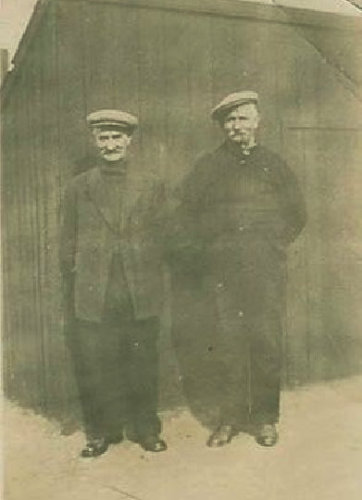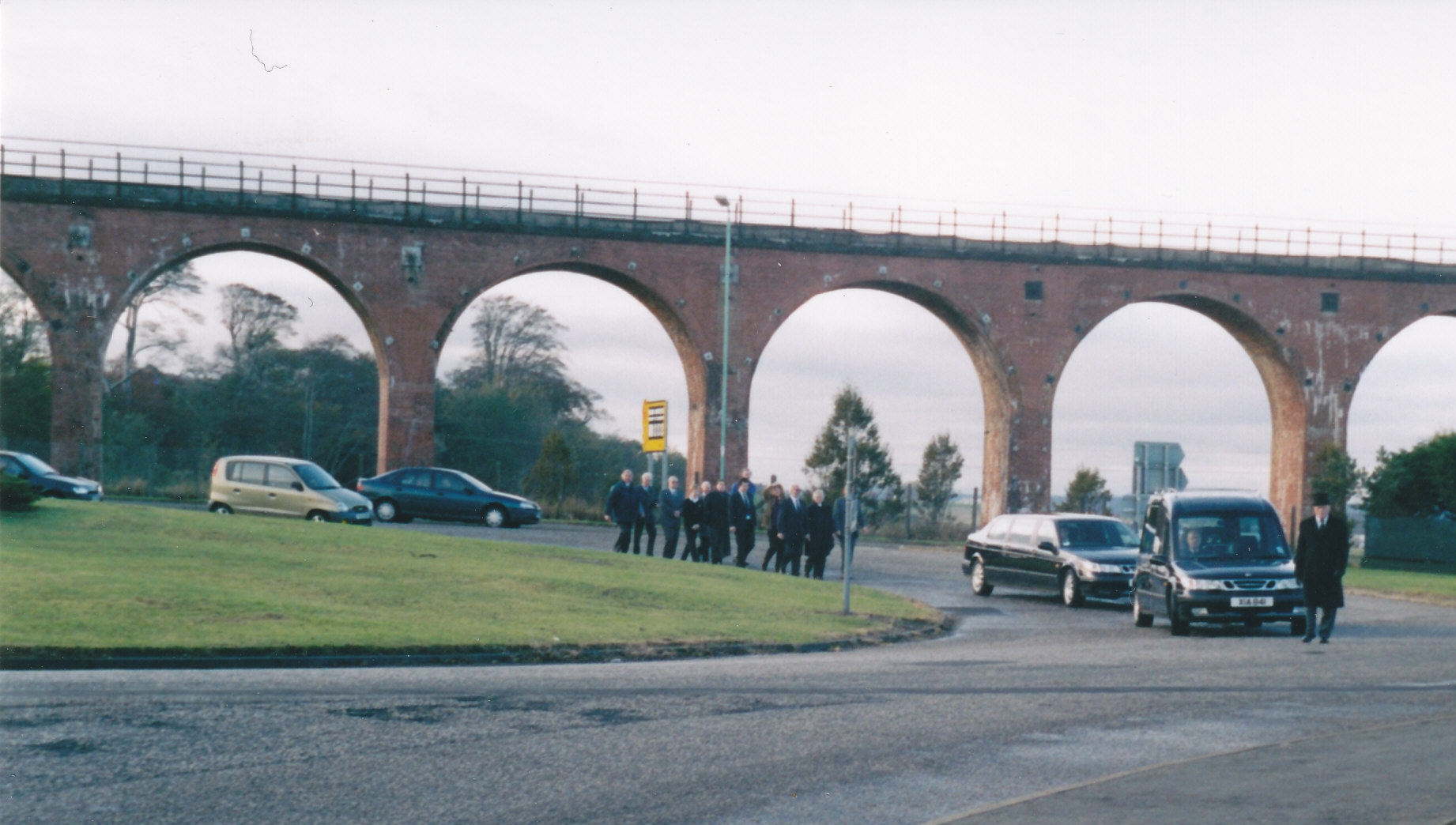The Early Years 1908—1920
David’s story begins in Cellardyke, the Eastern part of Anstruther in Fife, where his grandfather, Daidie Davy was one of the formidable local ‘dyker’ fishing community. David never knew his grannie, but his father , Jimmy Dick, came to Ferryden as a young man and married Mary Jane Findlay. They set up house in Victoria Square, known then as ‘the golden quarry’ and David was born in Number 15 on 30 January 1908.
He was one of 5 children, three boys, John, James and David, and two girls, Catherine (Kitty) and Mary. Mary died in infancy in 1918 aged 5 years 6 months. John emigrated to Australia where he died in 1969 without marrying. James married Liz Serafina in Montrose and had one daughter, Mary, as yet unmarried, presently lives in the Seagate, Montrose. James died in 1972, Kitty died without marrying, in 1974 after having been in-service in America and Dundee, and working in Paton’s Mill.
Aged 4, David went up the roadie, which still links Victoria Square and Beacon Terrace, to the infant school in Beacon Terrace. His teachers were Miss Ryrie and Miss Gray. His closest pals were Donald Paton (Barber`s Geordie`s family), George Stewart (the painter) and David Anderson (the stone-mason who lived in Bellview)
Around 1914 when David was 6, the family moved across the road to Number 22 Victoria Square next door to Danny and Grace West. Grace and David`s mother Mary used to sheel and bait together.
Sometime during the 1st world war, David`s grandfather, Daidie Davy, moved from Cellardyke to live in Ferryden where his son Jimmy and daughter-in-law Mary Jane could see to his needs. Daidie Davy had a single-end on the ground floor at 13 King Street and David fondly recalls time spent there listening to stories of the sea.
Aged 8 or 9, David moved from the infant school to the Senior School, ‘Up the Den’, where J Spiers Burt had taken over from Harry Adams as headmaster. His teachers were Miss Gray, Miss Scott and Miss Peddie (whom ‘Burtie’ married).
At playtime, David and Andra Gemlo would run doon the den to Andra`s house where they would get a piece (often a potted heid sandwich) from Andra`s mother. David recalls it was common for some mothers to appear at playtime and hand their offspring a piece through the railing. With a twinkle in his eye, David remembers one of his pals who had ‘up and doon marks on baith sides of his face left by the railings, where his mither geid him the briest until he was 14!’
Ferrydeners remember Burtie with affection, as a strict but kindly disciplinarian, and many owe their ability to name a wagtail or identify sourocks to Burtie`s famous nature walks. Mrs Burt read stories of ‘Wee McGreegor’ when the class earned a treat.
Even when David was a boy, Burtie had already instituted his ‘black book:’ this was a kind of dooms-day record of the week`s mis-deeds. On Fridays, Mr Burt would read out the names of the miscreants, the boys earning 2 or 3 strokes of the tawse, while the girls were made to wear a conical dunce`s hat and stand facing the wall in a corner.
During David`s time with Burtie, offenders were sometimes trusted to write their own names in the black book. Andra Gemlo never did twig that his regular punishments were due to David writing his pal`s name in place of his own.
This was typical of David, mischief and fun, in equal measure, a mixture which David drew upon throughout his life. When he was a boy, the Independent Labour Party had a branch in Ferryden in the ILP rooms (the roomies) located in Rossie Terrace, behind William Street with access off the short link connecting King Street with Rossie Terrace, known as the King`s Roadie. The secretary of this branch was John West (Johnny Wastie) and the roomies combined the function of political meeting place with recreational facilities. Hardly a night passed without a dozen or so worthies sitting round the open fire playing yooker (joker) or dominoes, whilst youngsters like David played ping pong or billiards on a half-size table.
The air was heavy with pipe and cigarette smoke and the pungent smell of fish glue from the glue pot hottering on the sway at the side of the fire—necessary for gluing new tips to the cues or making running repairs to the table tennis bats.
David found in the roomies, a rich hunting ground for his brand of fun—licking the tip of an opponents cue, or tying somebody`s bootlaces together under the table as they played dominoes. One such regular sufferer at his hands was Alex Coull, a near neighbour at No.14 Victoria Square. Alex was known as Elicky Toomble, or Boracky. He had a uniquely sonorous drawl and a violent temper when raised, but he did have a soft spot for the boy David.
As a youngster, David eked out any pocket money which came his way, by helping to weave and mend nets. His very favourite sponsor was Hughie West (Brownlow Place), a son to Geordie West (Menim) and Mug.
Many Ferrydeners still living will remember Hughie who was ‘affa sair aboot the feet!’ Despite having a splendid pair of hand-made surgical boots, Hughie only ever wore his wellies which over the years assumed the up-turned characteristics of his feet, a kind of rubber Aladdin slippers!
Summer days were passed mainly doon the beach, hauling in any passage boaties lying on their fore and eft moorings, skuggin’ for podlies off the rocks or at the pier and when the weather permitted, learning to swim first in the Tanny then the Podlie, two rock pools at the back of the lighthouse readily indentifiable to this day.
Daring to ‘cross the briggie in a swall’ was a common dare, the briggie being a natural rock bridge adjacent to the lighthouse sewage pipe. Sadly the briggie collapsed in the sixties/seventies.
Winter days meant sledging on the backie (Rossie Terrace) or doon the den (Usan Road), or ‘raisin a slide on any icy patch with the tackits in your boots’. The tackits would have been nailed there by Johnny Patonie in his shoemakers sheddie in Brownlow Place.
David well remembered regular visits by travelling evangelists (often temperance driven) and recalled being picked up and placed on a deep window cill by David Moffat, in the meeting room at 9 Victoria Square.
The King`s cinema was in full swing and a rare treat for the young David. He would get the ferry boat across and walk home via the West End park and the old brig. Being David, his favourite scam depended upon having a saxpence!
This was critical because the ferry-man at the time, Jimmy? (Marky) ‘couldna coont’, so when David gave Marky the sixpence and held out his hand for the change, Marky would keep up a stream of coppers, encouraged by David`s claim ‘Y`re short yet Jimmy’, until he had enough to pay for the picters and a pie and lemonade at Jolly`s shoppie on the island on the road hame.
David remembered one such visit to the Kings to see a film entitled ‘Way down East’. It was a drama depicting the life of a lumberjack in the Canadian outback. The primitive sound track made the most of the winter blizzard flickering on the screen, to the extent that David was constrained to remark to his pal ‘It’s gaen to be some job crossing the brig this nicht!’
Meanwhile, life for David’s parents was the unrelenting grind of work associated with earning a living at the sea, digging mussels, sheeling and baiting, shooting and hauling lines, redding lines, barking lines and repeating the process over and over, all for a pittance. David`s father Jimmy Dickie sailed with his brother-in-law Andra Findlay (Ackle) on board the Annie. Jimmy Dickie enjoyed the widest respect amongst his peers. His judgment of sea conditions was highly regarded as was his intuitive skill at locating the best ‘grunds’ (fishing grounds). He also had the honour to serve as an elder at the local Church of Scotland.
David loved to talk about his father and recalled one particular story with pride and relish. One day, the Annie landed a spectacular catch at the harbour in Montrose. Andra Findlay, the skipper supervised the unloading with Johnston`s tally man whilst Jimmy Dickie down below was responsible for sending up the loaded hampers. For every hamper that went ashore, Jimmy placed a fish in an empty fish box and awaited the final tally with the rest of the crew
Ackle came back to the boat with a scowl on his face. ‘I thocht we`d had mair nor that!’ was his muttered greeting to the crew, whereon Jimmy Dickie compared the company tally with his own and pronounced a shortfall of 14 hampers. Armed with the facts, Andra and Jimmy returned to the office, where on the strength of Jimmy`s word they ‘rectified their mistak’.

The photograph of 3 women was taken around 1925 on the beach below the ‘scooperie’ (Cooper`s Park), directly opposite the lifeboat sheds across the river. The woman in the centre of the group is Lizzie Stephen (maiden name Findlay but known as Lizzie Broonie), wife to Alex Stephen (‘Wheep’) and mother of Ackie and Betty Stephen. Women used to use the ‘scooperie’ to bleach linen in the sun and gather handfuls of grass to line the skulls prior to laying out a baited line.


This photograph of baiting a line is featured on page 26 of Joe West and Dorothy Morrison`s book "Old Ferryden". Mug and Geordie West (Menim) are seen sitting on stoolies each with a skull into which the baited line is coiled. Mug`s skull plainly shows the lining of dried grass upon which the baited hooks are laid out. The sheeled mussels are placed on the ‘bait brot’ (the bait board) which is seen lying across the tub. The grass and hooks are carefully set out at the top end (the gob end) of the skull and the other end of the skull is inevitably the ‘erse end’.
One of Jimmy Dickie`s favourite sayings was ‘A`body maks a passage’. We had hoped to include this on David`s family stone but there just wasn`t the space.
In 1957 Jimmy Dickie was 79 and took badly in their house at Kirk Wynd. He became bed-bound and David sat up with him most nights assisted by his sister Kitty.
David would help him with his food and so on, and light his pipe for him. Jimmy referred to David as ‘ma dog’ and David-never a sentimental men– recalls his father’s final words when offered the pipe after his supper ...
"Tak it awa ma dog! The tobacco winna bide in an’ the matches winna light".










